This book challenges the conventional wisdom that natural resource wealth promotes autocracy. Oil and other forms of mineral wealth can promote both authoritarianism and democracy, the book argues, but they do so through different mechanisms; an understanding of these different mechanisms can help elucidate when either the authoritarian or democratic effects of resource wealth will be relatively strong. Exploiting game-theoretic tools and statistical modeling as well as detailed country case studies and drawing on fieldwork in Latin America and Africa, this book builds and tests a theory that explains political variation across resource-rich states. It will be read by scholars studying the political effects of natural resource wealth in many regions, as well as by those interested in the emergence and persistence of democratic regimes.
Les mer
1. Does oil promote democracy?; 2. The foundations of rentier states; 3. Resource rents and the political regime; 4. Statistical tests on rents and the regime; 5. The democratic effect of rents; 6. Rentier democracy in comparative perspective; 7. Theoretical extensions; 8. Conclusion: whither the resource curse?
Les mer
“Thad Dunning has produced an outstanding book, founded on a theoretically-sophisticated re-evaluation of the popular and academic consensus linking oil and resource wealth to political authoritarianism. By showing – both in game theoretic and empirical terms – how resource wealth can promote both democracy and authoritarianism, albeit through separate mechanisms, Dunning provides the first account that simultaneously explains the well-known cases of oil-based authoritarianism as well as the oft-overlooked resource-rich democracies. It is an analytical tour-de-force that will likely set the bar for future studies of resource politics, and through its innovative marriage of formal, statistical, and qualitative tools, for comparative politics more generally.”
-Marcus Kurtz, Ohio State University
Les mer
This book challenges the conventional wisdom that natural resource wealth promotes autocracy.
Produktdetaljer
ISBN
9780521730754
Publisert
2008-09-08
Utgiver
Vendor
Cambridge University Press
Vekt
510 gr
Høyde
229 mm
Bredde
152 mm
Dybde
20 mm
Aldersnivå
P, 06
Språk
Product language
Engelsk
Format
Product format
Heftet
Antall sider
350
Forfatter
